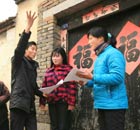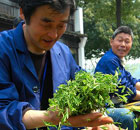Op-Ed Contributors
Widen the table on rice debate
By Li Dun (China Daily)
Updated: 2010-02-24 07:44
 |
Large Medium Small |
Though the government has approved the planting of genetically modified (GM) rice in Hubei province on a trial basis, controversy persists.
Opponents doubt that GM rice is safe. They wonder if it poses a health risk and question the rice's impact on the environment and biological diversity. However, advocates stress that transgenic technology is a "unique" method available for ensuring grain security amid China's increasing population and depletion of arable land.
Some biosafety committee experts at the Ministry of Agriculture, for example, argue that their assessment that GM rice is safe was based on experimental research, tests, environmental releases, production tests and application of safety production certificates.
But how do we make a decision on GM rice? Who should be responsible for an issue that concerns not only our health but the lives of our children? Who should be the decision-makers even if no one can make the claim that GM rice is safe except for some special "experts"?
| ||||
At times, we are only able to hear the voices of scientists or experts of one argument while the opposing voices of others are screened from the masses. We now urgently need a decision-making process that takes into account the interests of different groups. Decision-makers and the public must make choices based on the complete awareness of various opinions, and the public should have the opportunity to participate in deciding major choices that affect their interests.
Guided by the "Put People First" core of China's newly set governing philosophy, the government should prudently arrange the institutional regulation of foods and drugs. Without sufficient evidence that proves a certain food or drug is not harmful to your health, the products must not be allowed into the market.
Industrial revolution has made people believe that humans can conquer and change everything and do as we please. Now the governmental proposal of "harmonious development between human and nature" guides a new orientation for correcting our previous mistakes.
Opponents argue that GM rice from genetic engineering is essentially different from hybridized rice. GM rice cannot raise yields as it claims though it could be pest-resistant, and since it has the ability to breed, it might change or even deracinate China's rice varieties. Still, there is no convincing explanation about why GM corn caused organ damage in test rats. And furthermore, what potential risk can GM crops pose for us and the next generations to come? Should the companies and experts who are relentlessly advocating GM rice be obliged to make their evidence of support clear and understandable to decision-makers and the public before any verdict?
Nearly 80 percent of the world's GM crops are products of one single American company and more than half are cultivated in the US. But other than bringing profit to GM crop manufacturers, it has not resolved the problem of poverty. Fifteen percent of the world's population is starving not because there is no food available, but they simply have no money to buy it.
China was a net exporter of soybeans before 1995. But after importing GM soybeans, its foreign dependency rate has reached more than 80 percent. Local non-genetically modified soybeans are being driven out of the market place and even facing extinction because it's not economically competitive compared with GM soybeans. If we buy GM soybean seeds whose patents are held by foreign companies, we have no room to bargain on prices. The interests of farmers should also be considered in the decision-making process.
No longer are we in an era where a small number of people should be making decisions behind closed doors in the interests of the majority. In terms of the decision-making on commercializing GM foods, the authority needs to publicize comprehensive, accurate and genuine information and hear all of the different opinions with full participation and thorough debate from the public. Decisions should be made by the National People's Congress or its standing committee, because it concerns the health and lives of each of us and our children.
We should clearly record and publish the names of officials who approve major projects that affect the lives of people. We should also record and publish the name of experts who provide evidence or endorse the decisions of the government - especially when these decisions entail irreversible consequences - so that we can make officials accountable and decide whether to praise or blame the officials and experts alike. Only by doing so can we oblige these officials and experts involved in the decision-making process to remove their self-interests and uphold the interests of the general public.
The author is a researcher with the Chinese Academy of Social Sciences. The article first appeared in the Outlook Weekly magazine.
(China Daily 02/24/2010 page8)












